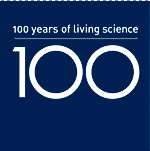Timeline
- 1845 – 1899 |
- 1900 – 1909 |
- 1910 – 1919 |
- 1920 – 1929 |
- 1930 – 1939 |
- 1940 – 1949 |
- 1950 – 1959 |
- 1960 – 1969 |
- 1970 – 1979 |
- 1980 – 1989 |
- 1990 – 1999 |
- 2000 – present
Imperial College 2000 - present
World
 2001 - 9/11 attack on World Trade Centre
2001 - 9/11 attack on World Trade Centre
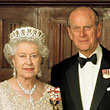
2002 - Queen Elizabeth II Golden Jubilee
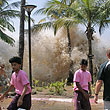
2004 - Boxing Day Tsunami
College
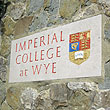 2000 - Merger with Wye College
2000 - Merger with Wye College
1 August 2000 marked the merger of Imperial College with Wye College. Wye, based near Ashford, Kent, has an international reputation for research-led teaching in biological sciences, the environment, agricultural economics and business management, agriculture and horticulture. It is also home to an award-winning Distance Learning Programme, offered in conjunction with the University of London.
Lord Oxburgh, then Rector of Imperial College said the merger created "tremendous opportunities to bring together the strengths of Wye College in food, agriculture and the environment with…complementary activities…at Imperial College. This powerful combination will stimulate inter-disciplinary research and new initiatives."
Wye has been a centre of learning since 1447 when it was founded as a priests’ college by Cardinal John Kempe. Its 560th anniversary in 2007 has been marked by another historic event – a partnership with the University of Kent to run the popular Applied Business Management (ABM) undergraduate and postgraduate degree programmes.
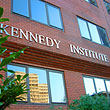 2000 - Merger with Kennedy Institute
2000 - Merger with Kennedy Institute
On 1 August 2000, the Kennedy Institute of Rheumatology merged with Imperial College, becoming the ninth division of the Imperial College School of Medicine.
The objectives of the Institute are:
- to enable basic and clinical research to be undertaken into the aetiology of rheumatoid and osteoarthritis and to develop preventative and therapeutic interventions;
- to maintain a critical mass and international centre of excellence for research, training and teaching;
- to collaborate with the industrial, university and health service sectors in the innovation and improvement of healthcare to patients
These objectives have resulted in the development of anti-TNF therapy for the treatment of rheumatoid arthritis by Professors Ravinder Maini and Marc Feldmann, for which they have been awarded the 2000 Crafoord Prize by the Royal Swedish Academy of Sciences and the 2003 Lasker Award, known as America's Nobel.
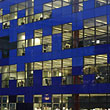 2001 - Faculty structure introduced
2001 - Faculty structure introduced
In May 2001, a new Faculty structure was created at the College, with all departments being assigned to the Faculties of Engineering, Medicine, Physical Sciences and Life Sciences. This new structure facilitates interdisciplinary and collaborative work in both research and teaching.
Life Sciences and Physical Sciences merged to become the Faculty of Natural Sciences in November 2005.
A new Faculty Building was opened in May 2004 with the aim of supporting the new Faculty structure by improving communication between academic management and the support services.
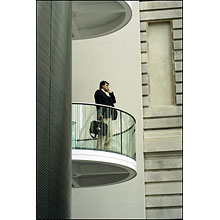 2001 - Entrepreneurship Centre launched
2001 - Entrepreneurship Centre launched
Tanaka Business School's Entrepreneurship Centre was launched in January 2001, and since then has gained a reputation as one of Europe's most accomplished centres for the teaching and practical application of entrepreneurial ideas. The Centre focuses on new venture creation in technology sectors, and its MBA activities are consistently rated amongst the global top 10 in the Financial Times MBA survey.
In 2001, under the banner 'One day you will need more than just a degree', the Entrepreneurship Centre created the Entrepreneurs' Challenge, an annual business plan competition for Imperial students that offers seminars by leading companies such as Shell and Amadeus Capital, with total prize money of £55,000.
 2001 - Schistosomiasis Control Initiative established
2001 - Schistosomiasis Control Initiative established
In 2002, the Bill & Melinda Gates Foundation gave a grant of $30 million (£20 million) to establish the Schistosomiasis Control Initiative (SCI), a partnership at Imperial College London including the foundation, the World Health Organisation and the Harvard School of Public Health.
Since then, the programme, led by Professor Alan Fenwick, has treated over 20 million children and adults in high risk situations, as well as providing health education and monitoring. The SCI provides a model for the successful control of this parasitic disease, which threatens approximately 600 million people in regions where water supply and sanitation are inadequate.
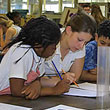 2003 - Volunteer Centre established
2003 - Volunteer Centre established
The Volunteer Centre was established in 2003 in order to give staff and students the opportunity to gain new skills and experiences while putting something back into their community. A side-effect of the scheme is that volunteers are often able to de-mystify the university experience, thereby raising the academic aspirations of young people who may not otherwise have considered higher education.
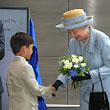 2004 - Opening of College Main Entrance and Tanaka Business School
2004 - Opening of College Main Entrance and Tanaka Business School
Imperial's new Main Entrance and accommodation for Tanaka Business School was officially opened by Her Majesty The Queen, accompanied by The Duke of York, on 24 June 2004.
Made possible by a £27 million pledge by technology investor and Imperial alumnus Dr Gary Tanaka, the landmark building creates a highly-visible entrance to the College on Exhibition Road. The new building is designed by international architecture, planning and design studio Foster and Partners.
Welcoming Her Majesty, Sir Richard said:
"The building in which we now stand represents another step in bringing to fruition the far-sighted vision and wisdom of your ancestor, Prince Albert. Far ahead of his time, he recognised that people would live better, in a more prosperous country, if art and science were properly directed to useful purposes.
"Innovative science and scientists are essential to successful industry. It is entirely fitting, therefore, that our Tanaka Business School is at the very portal of the College. We compete on a global stage, and to have a building, as splendid as this, on one of London's great thoroughfares, sends a message to the world about the role of learning and discovery in this fast changing world and Imperials contribution to that."
Watch the official opening ceremony.
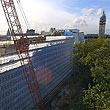 2005 - Demolition of Southside
2005 - Demolition of Southside
The replacement of the outdated Southside student accommodation, opened in 1963 and increasingly unable to meet residents' requirements, suffered from concrete maintenance problems and lack of adaptability for present student requirements. Find out more about the original halls.
Watch the official commencement of demolition in 2005.
The new Southside building is designed to be in keeping with the local area, being lower and faced with stone, and will provide high quality accommodation for students with a range of budgets. It will open in October 2007.
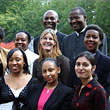 2005 - Launch of Imperial as One
2005 - Launch of Imperial as One
Imperial as One was launched in July 2005 as an initiative to promote equality and diversity. It is an advisory group, made up of black and minority ethnic (BME) staff, designed to take a leading role in supporting and promoting an inclusive workplace culture of respect, opportunity, unity, transparency and equality. The group works to continually tackle and manage issues of racism, discrimination, fear and prejudice.
The group aims to achieve this by:
- Contributing towards the recognition and promotion of good employment practices for all staff, irrespective of race.
- Upholding the highest ideals in the management and development of all people that recognises and values diversity of all staff.
- Working to ensure that racial equality becomes a reality by enabling all staff to participate in College life, and to contribute to the College's achievements and successes, through the development of their personal and professional skills.
 2006 - Decision to withdraw from University of London
2006 - Decision to withdraw from University of London
Imperial College London has been a college of the University of London since 1908 and has always awarded University of London degrees. Recognising Imperial College as a world-class research and teaching institution in its own right, on 14 July 2006 Imperial College's Council made the decision that Imperial should withdraw from the University of London and become a university, independent from any other organisation or structure. Imperial College's request to withdraw was agreed by the University of London's Council on 4 October 2006.
 2006 - Prince Albert Challenge Cup
2006 - Prince Albert Challenge Cup
Imperial became the only university to donate and name a trophy at Henley Royal Regatta - and then became the first team to take the new Cup home.
The Prince Albert Challenge Cup, presented to the Regatta by Rector Sir Richard Sykes in the presence of Her Majesty The Queen, was named in honour of the Regatta's first Royal Patron, Prince Albert, who also has strong connections with Imperial's origins as part of the South Kensington science and technology quarter known as Albertopolis.
An Imperial Boat Club team won the cup in the Men's Student Coxed Fours event, beating the University of London crew by four and a quarter lengths in the final. The team won out over Queen's University Belfast, Bristol and Durham on their way to the final, setting new course records in the process.
 2007 - Lift off for Centenary!
2007 - Lift off for Centenary!
Imperial's Centenary year was officially launched on Tuesday 30 January with a range of events taking place across Imperial's nine campuses. In a day that celebrated a century of both academic achievement and community life, students released 500 balloons and exhibited the Union's mascot cars, a 1916 fire engine and a 1902 James and Brown car. There were tours of the Queen's Tower, the 287 foot bell tower that stands at the centre of the College's South Kensington Campus, and put on displays of juggling, skating and music.
Dining rooms at the College served cuisine from a 1907 menu recently discovered in the College archives, offering a three course meal including devilled whitebait and guinea fowl for 30 shillings (£1.50). Centenary wine was also available for one guinea (£1.05) per glass.
For many on the day, the icing on the cake was just that. Centenary cakes were ceremonially cut and distributed at all of the College campuses and over 5,000 slices were eaten within a matter of hours.
The day ended with a sold out lecture from the Rector, Sir Richard Sykes, just a taste of the exciting events taking place in the Centenary year.
Read the news release for more information
Read and view images from the launch day in the staff newspaper
Watch the RealPlayer stream of Sir Richard Sykes' Lecture
Download the podcast of Sir Richard Sykes' Lecture (342mb)
Podcasts are large files. To download right click and choose 'save target as' and save to your computer.
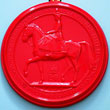 2007 - Independence from the University of London
2007 - Independence from the University of London
In January 2007 Imperial College sent a formal petition to Her Majesty the Queen for the granting of a supplemental Charter and Statutes.
It is anticipated that Imperial College will be independent from the University of London from 8 July 2007, the College's 100th birthday. Imperial has been able to award its own degrees since May 2003 and will use this power after its withdrawal from the University. It is envisaged that the first Imperial College degrees to be awarded will be honorary degrees in the summer of 2007.
People
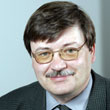 Professor Donal Bradley
Professor Donal Bradley
Donal Bradley's research focuses on the development of molecular electronic materials and devices, including polymer light emitting diodes to which he holds the patent.
PLEDs are now being developed as a next generation technology for flat panel displays, with electronics company Philips already using the technology in a number of products. The light, durable and low-energy displays they produce can be used for a number of electronic devices such as mobile phones, MP3 players and DVD consoles. PLEDs can also have medical applications, as they can provide a light source for microanalysis chip to be used in point of care diagnostics. Molecular Vision Ltd, a spin-out set up by Professor Bradley with Imperial College chemists John and Andrew de Mello, is currently developing this technology.
Professor Bradley, now Imperial's Head of Physics, is the recipient of a number of prestigious awards including the 2003 Descartes Prize and the Jan Rajchman Prize, and is one of the most highly cited physicists today.
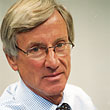 Sir Richard Sykes
Sir Richard Sykes
Sir Richard Sykes, former Chairman and Chief Executive of GlaxoSmithKline, became Imperial's thirteenth Rector in January 2001. Under his leadership, the College has consolidated its position as a world-leading centre of innovative research, rated the ninth best university in the world in the latest Times Higher Education Supplement World University Rankings.
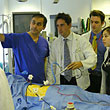 Professor Sir Ara Darzi
Professor Sir Ara Darzi
Professor Sir Ara Darzi holds the Paul Hamlyn Chair of Surgery and is also head of the Division of Surgery, Oncology, Reproductive Biology and Anaesthetics.
Since joining Imperial in 1995, he and his team have worked extensively on surgical technology and its wider application. Professor Darzi and his colleagues have pioneered the use of minimally invasive techniques in surgery in the UK, enabling surgeons to perform microscopic and macroscopic operations in places which formerly could be reached only with large incisions. The benefits of this new surgery include less operative trauma for the patient, reduction of hospitalisation time, less pain and scarring, and reduction of the complications related to the surgical trauma.
A famous example of his pioneering work is Da Vinci, the first minimal access system capable of eliminating natural tremor in a surgeon's hand. Controlled by surgeons using a 'joystick' while seated at a terminal, Da Vinci's hands make incisions, returning the dexterity lost with keyhole instruments due to its special wristed joints and 3-D vision. Da Vinci became famous when it featured in a scene in James Bond's Die Another Day film.
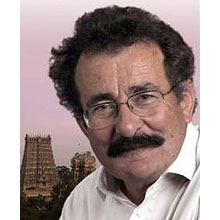 Lord Robert Winston
Lord Robert Winston
Robert Winston studied medicine and became a registrar at Hammersmith Hopsital in 1970. He became Reader in Fertility Studies, RPMS at the Royal Postgraduate Medical School in 1982 and Professor in 1986.
He has conducted pioneering research in in-vitro fertilisation and reproductive genetics. The research of his team enabled families with a history of a particular genetic disease to have children free of fatal illnesses. This work on Preimplantation Diagnosis also led to the first diagnosis of chromosome disorders (e.g. Down's Syndrome in embryos) and establishing the sex of a baby.
Professor Winston is also an excellent communicator and has presented a number of very successful TV series including The Human Body and Child of Our Time. As a member of the House of Lords he plays a very active role in debates on education and science. He also served as the president of the British Association for the Advancement of Science from 2004 to 2005.
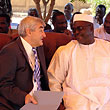 Professor Alan Fenwick
Professor Alan Fenwick
Alan Fenwick directs the Schistosomiasis Control Initiative, established at Imperial in 2002, which builds on his extensive research into combating tropical diseases in developing countries.
His work to combat schistosomiasis started in 1966 in Tanzania and he also worked in Sudan and Egypt for many years to tackle the parasitic disease that leads to chronic ill-health and affects more than 200 million people in developing countries.
More recently Professor Fenwick and other experts warned that the concentration on the "big three" diseases of Aids, tuberculosis and malaria has diverted resources from half a dozen easily treated illnesses that have a greater impact on healthcare and economic development in Africa. The group went on to call for a low-cost but highly effective public health programme that would target diseases like lymphatic filariasis, schistosomiasis, intestinal helminths, onchocerciasis and trachoma, which can be treated with cheap but highly effective drugs.
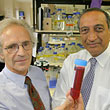 Professors Ravinder Maini and Marc Feldmann
Professors Ravinder Maini and Marc Feldmann
Ravinder Maini (right), Emeritus Professor of Rheumatology, and Marc Feldmann, Professor of Cellular Immunology, have researched extensively on rheumatoid arthritis and made major breakthroughs in its treatment. Their work paved the way for anti-TNF drugs, which have transformed the lives of thousands of people worldwide.
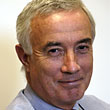 Professor Sir Roy Anderson
Professor Sir Roy Anderson
Professor Sir Roy Anderson conducts theoretical research on epidemiology, using mathematical models to predict the effectiveness of different methods of containment for diseases such as SARS, BSE and vCJD, and foot and mouth. He is currently seconded as Chief Scientific Advisor to the Ministry of Defence.
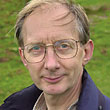 Professor Sir John Pendry
Professor Sir John Pendry
John Pendry, Professor of Theoretical Solid State Physics, is one of the founders of the field of metamaterials. This led to the demonstration of the world's first 'invisibility cloak' in 2006, constructed from metamaterials, built from artificial atoms that cause microwaves to split and flow around the material rather than penetrating and bouncing off it to make it detectable. This breakthrough could have a variety of applications for radar and communications technologies.
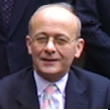 Lord Kerr of Kinlochard
Lord Kerr of Kinlochard
Lord Kerr of Kinlochard took up the post of Chairman of Court and Council in January 2005. "To work for Imperial is a huge honour," said Lord Kerr. "They are, and will stay, second to none."
Born in Scotland in 1942, John Kerr, (son of a Glasgow University Cardiologist), joined the UK Diplomatic Service in 1966. His early career was spent principally on politico-military issues, including in the Embassies in Moscow and Washington, and on economic issues, including Development in Pakistan. He was seconded to the Treasury from 1979 to 1984, worked on early privatisations, and became Principal Private Secretary to two Chancellors of the Exchequer. From 1987 to 1990 he was the Foreign Office's European Community Under-Secretary, and from 1990 to 1995 was UK Permanent Representative to the European Union.
In 1995 he returned to Washington as Ambassador, and from 1997 to 2002, back in London, was Head of the Diplomatic Service and FCO Permanent Under-Secretary of State, the first member of the Service to hold its three top jobs. His tenure as Permanent Under-Secretary saw the return of a British ambassador to Iran, the establishment of an Embassy in North Korea, and the re-opening of the embassy in Libya. In 2000 he became the most senior UK official to visit Tripoli since 1984.
On leaving the FCO he held the international appointment of Secretary-General of the European Convention, chaired by President Giscard D'Estaing, which prepared the EU Constitutional Treaty. He became an (independent) member of the House of Lords in 2004, and serves on its EU Select Committee. A Director of Shell since 2002, he chaired the group who instigated the unification with Royal Dutch, and has been Deputy Chairman of Royal Dutch Shell plc since 2005. He is also on the Boards of Rio Tinto and the Scottish American Investment Trust.
Lord Kerr is Deputy Chairman of the National Gallery; is a Trustee of the Rhodes Trust, the Fulbright Commission, and the Carnegie Trust for the Universities of Scotland; and Hon President of the Universities Association for Contemporary European Studies.
A graduate of Pembroke College, Oxford, he has Honorary degrees from the Universities of St. Andrews and Glasgow. Supporting QPR, and having 5 children, has accustomed him to adversity.
© 2007 Imperial College London
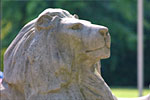
Through the first decade of the twenty-first century the campaign seeks to philanthropically raise £207 million from Imperial’s alumni, staff and friends, and donations from charitable foundations and industry.
Where your support can make a differenceGive now

We’re celebrating 100 years of living science with 100 stories. We’ve collected some of them already, and invite you to share your own stories and memories.

